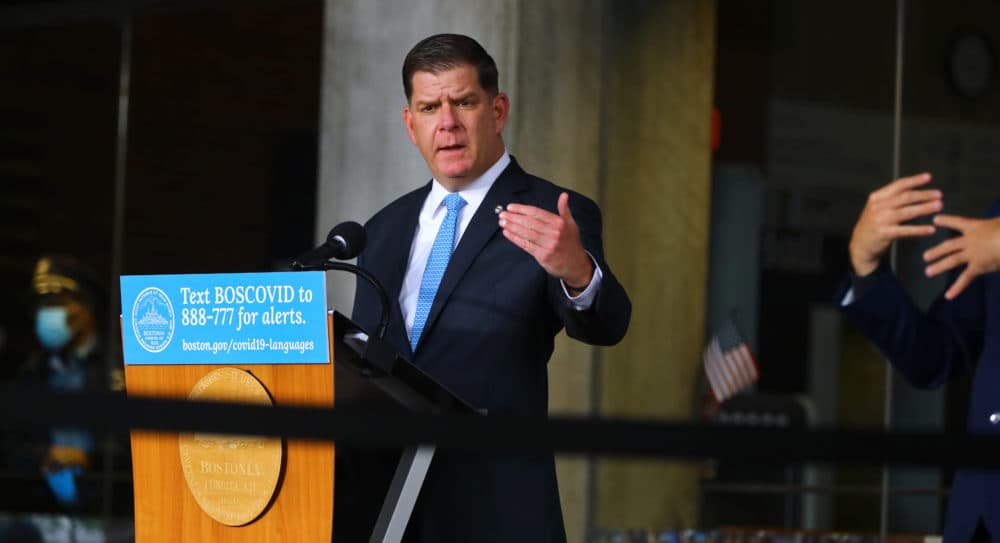Advertisement
Coronavirus Coverage
On June 1, Boston Offices Can Bring Back 25% Of Workers. Mayor Walsh Expects Fewer Will Return
Resume
In Boston, partial reopening of offices is slated to begin on Monday, a week after offices around the state began reopening their doors.
Meanwhile, the city is ramping up efforts to support small businesses as they struggle to reopen in the face of stringent new social distancing rules.
Boston Mayor Marty Walsh joined WBUR's Morning Edition to discuss this latest phase of Boston's cautious reopening, and what to expect next.
Interview Highlights
On Boston offices opening at 25% capacity on Monday
Walsh: "I don't think we're going to see the full [25%] capacity in the first phase. But I definitely think that we'll see an increase in activity in the city. We can already see it in the morning, a little bit more on the highway — more and more cars starting to travel.
"So I think it'll be a phased reopening. I think a lot of offices are going to be cautious about how they reopen. But I think we will start we will see more activity, definitely."
On balancing the need for caution amid the need to reopen
Walsh: "We have to begin to open the economy, we have to begin to get back to some resemblance of normalcy here. ... It's really incumbent upon all of us to be very cautious as we reopen; to make sure we continue to practice physical/social distancing and wearing face masks. That's going to be key in stopping what could be a second surge here. But I think that we do need to get the economy going. There's going to be deep implications if we don't."
Low expectations for summer tourism in the city
Walsh: "I think it will be very different than last summer. I think it depends on where we are with the numbers of COVID-positive folks here, in Massachusetts and Boston, but also around the country. I don't expect a very heavy tourist industry right now — this summer. But again, it's about how we reopen and what precautions our hotels and restaurants can put in place and if people feel safe enough to travel. But I do expect it to be slower than last year."
On Boston's ongoing night-time curfew from 9 p.m. to 6 a.m.
Walsh: "We haven't had a conversation about when to lift that, but for the most part ... there's not a lot of places for people to go at night. ... The restaurants aren't open ... the streets are generally quiet. So we're going to be taking this one day at a time."
On the planned expansion of bus lanes and bike lanes in the city
Walsh: "It's still early. We're gonna pilot them and see how they work. ... We're looking at how do we improve transportation? ... In some cases, people aren't going to take public transit and they don't want to take the car, so I think we'll see increased biking. I think we'll see increased walking in the city of Boston. And what we want to do is make sure that we think outside the box and become creative on this and speed up some of the conversations we've had to run these pilots and see what happens."
On the mayor's concern about a second wave of COVID-19
Walsh: "I am concerned about a second surge. You know, I think that all of the experts have expressed that to us: That if we move too quickly — if, you know, everyone on Monday comes back to work at 25% in offices — that's a lot of people on one day. And I think we have to kind of ease our way back into our jobs."
On the mayor's 27-person reopening task force
Walsh: "They're gonna be looking at some of our reopening plans that we've done here in the city, and they're also going to be talking about economic development. It really is just about getting some advice on moving forward. You know, we have a couple of really important committees going right now: the Health and Equity Task Force, which I think is really important for the future of our city — not just in dealing with the COVID situation right in front of us, but also with dealing with inequities in the long term.
"The advisory board is more a board that we can work with every day to talk about how we are reopening and what people's opinions are. We have a lot of different sectors on there, a lot of diversity on there, to really kind of get a snapshot of the city."
This article was originally published on May 28, 2020.
This segment aired on May 28, 2020.
